

In 2013, December 5 was declared World Soil Day by the United Nations General Assembly.
The soil is alive! Around 5 billion soil organisms live in a handful of healthy soil. Preserving this diversity means securing the basis of human life on this planet.
In 2020, the Fédération Internationale des Jardins Familiaux published the brochure "Soil is alive! Protecting soil in allotment garden". This should be read by the allotment garden family in order to protect the patch of soil entrusted to them.
Over the last four years, another aspect of soil protection has become increasingly important. Increasing weather extremes show how important it is not only to look after the quality of the existing soil, but also to ensure that sufficient unsealed soil is available.
Soil unsealing in the allotment garden
 A sealed soil cannot fulfill its tasks. Water, oxygen and light cannot be stored in the soil and fertility is lost. Pollutants are no longer filtered by the plants and there is no cooling effect.
A sealed soil cannot fulfill its tasks. Water, oxygen and light cannot be stored in the soil and fertility is lost. Pollutants are no longer filtered by the plants and there is no cooling effect.
Allotment gardens are of great importance for the urban climate and water storage as, in addition to the cooling green spaces, they promote a high level of biodiversity in otherwise built-up areas. But even on this small scale, a minimum of sealed surfaces is essential. We would therefore like to call for a conscious approach to sealed areas in your garden. As small as these may seem in proportion, it is important to implement unsealing measures wherever possible.
Alternatives to sealed surfaces
Ideally, as many infiltration-capable areas as possible should be used right from the initial garden planning stage. However, it is never too late to make subsequent optimizations.
The most common alternatives to sealed surfaces in the garden include:
• Gravel lawn or overgrown grass pavers
• a hard-wearing herbal lawn
• Wooden decking with drainage layer
• Laying recycled materials such as old bricks
• Paving stones for small paths in the garden ...
 The aim is to use water-permeable paving wherever possible. If you identify rarely used sealed areas in your garden, you should convert them into green spaces. This not only creates living space but also has a cooling effect. However, in addition to this complete unsealing, partial unsealing can also make an important contribution.
The aim is to use water-permeable paving wherever possible. If you identify rarely used sealed areas in your garden, you should convert them into green spaces. This not only creates living space but also has a cooling effect. However, in addition to this complete unsealing, partial unsealing can also make an important contribution.
Partial unsealing involves removing the top impermeable layer and loosening the layer below to improve infiltration.
At this point, we would like to refer you to an article by "Die Umweltberatung". In its article "Types of soil unsealing", it refers to a variety of partial unsealing options.
The new garden areas created in this way offer the opportunity to create diversity for plants and animals. For example, the joints can no longer be neatly scraped out, but deliberately planted. When laying paths, use a sand-humus mixture and enjoy the growing wild herbs.
These unsealed areas can be more costly to maintain and preserve, but the reward is healthy soil for the allotment gardener and an important contribution for their fellow human beings in dealing with the changing climate conditions.
3 March was "World Wildlife Day" (UN World Wildlife Day). This was introduced in 1973 as part of the Washington Convention on International Trade in Endangered Species of Wild Fauna and Flora (CITES). This agreement protects endangered wild species (animals and plants).
CITES primarily protects endangered species from trade and regulates their keeping and breeding. However, the intention of protecting endangered animals and plants from extinction can also be supported on a small scale in your own garden.
Contribution of the allotment gardeners
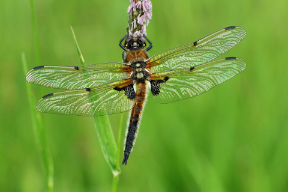 Some wild animals seek refuge in allotment gardens because they are driven out of their traditional habitats by agriculture and building activities.
Some wild animals seek refuge in allotment gardens because they are driven out of their traditional habitats by agriculture and building activities.
By creating diverse habitats, we as allotment garden families can protect these displaced species and contribute to the preservation of biodiversity.
We leave leaves and brushwood piles for hedgehogs. Native shrubs and natural hedges are important retreats and food sources for birds and should be used instead of thujas and cherry laurel. Fortunately, these and other nature-orientated recommendations are already frequently implemented.
In this article, we want to focus on a small insect that is an endangered species. Allotment gardeners can contribute to its conservation by providing a variety of habitats and by gardening in a natural way.
Shining example
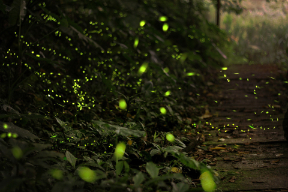 Exactly! Fireflies are a rare but all the more popular guest in your own garden.
Exactly! Fireflies are a rare but all the more popular guest in your own garden.
In the case of the "small fireflies" (common firefly), the flying male puts on a light show in summer. If, on the other hand, you discover a fixed light shining on the ground, this is the female of the "large firefly" trying to attract a mate.
Fireflies are not only beautiful to look at in the garden, they are also important beneficial insects. The larvae prefer to eat slugs and snails, which they kill with their venomous bites.
The example of the firefly shows how important the diversity of habitats in the garden is.
Their original habitat is forest edges, bushes, damp meadows and gardens. In the course of its perennial development, the firefly needs different habitats.
These include warm sunny and moist shady spots, shrubs for a better view when searching for a mate, as well as piles of branches and dry stone walls for shelter. A flower or herb meadow would be ideal for the fireflies. But at least in one part of the garden, you should provide a wild corner.
Females are particularly well attracted by the heat generated by piles of cuttings left lying around. However, you should never try to "relocate" fireflies from their home territory yourself.
The greatest danger to the firefly is the use of slug pellets and other synthetic pesticides. Mineral fertilisers should also be replaced with compost and organic fertilisers. Light pollution is also an ever-increasing danger for the luminous beneficial insects. The larvae become less active due to light and their successful search for mates is severely disrupted. Artificial lighting should therefore be minimised as far as possible. Necessary light sources should only shine directly onto the ground. Motion detectors can be used to reduce the duration of lighting.
Supporting natural species diversity
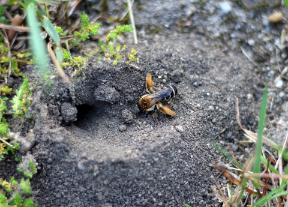 Even if we have limited ourselves to the firefly today, many endangered species naturally benefit from the diversity of habitats in your own garden. For example, herb snails with dry stone walls are an ideal retreat for lizard species and a sandarium is the ideal nesting place for endangered wild bees.
Even if we have limited ourselves to the firefly today, many endangered species naturally benefit from the diversity of habitats in your own garden. For example, herb snails with dry stone walls are an ideal retreat for lizard species and a sandarium is the ideal nesting place for endangered wild bees.
Not only animals but also plants are protected by the species protection agreement. In the interests of biodiversity, allotment gardeners can contribute to the continued existence of rare species through the diversity of varieties of herbs, fruit, vegetables and other plants. Swap your "treasures" with your neighbours or visit one of the rarities exchanges to achieve this diversity. In this way, species beyond the mass assortment from the DIY and garden centres are preserved and in turn provide animals with food and alternative habitats.
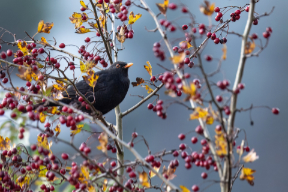 The UN World Wildlife Day is not just a declaration of intent by the United Nations. We allotment gardeners can support endangered wild species by gardening close to nature and providing a diverse range of habitats in our own "little green space".
The UN World Wildlife Day is not just a declaration of intent by the United Nations. We allotment gardeners can support endangered wild species by gardening close to nature and providing a diverse range of habitats in our own "little green space".
We recommend the "VERSATILE GREEN SPACES" guidelines from the SYM:BIO project as support for implementation.
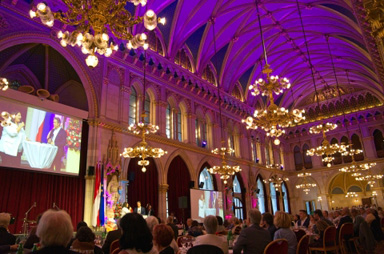 On 21 October, around 500 invited guests gathered in the large ballroom of Vienna City Hall for the 26th Allotment Garden Award Ceremony of the City of Vienna.
The allotment garden family had been invited in advance to send in entries for the creative competition with this year's motto "The magic in the allotment garden".
The jury anonymously assessed the 179 entries in four categories and awarded the prizes. The award winners were duly celebrated in the festive setting of the gala event.
On 21 October, around 500 invited guests gathered in the large ballroom of Vienna City Hall for the 26th Allotment Garden Award Ceremony of the City of Vienna.
The allotment garden family had been invited in advance to send in entries for the creative competition with this year's motto "The magic in the allotment garden".
The jury anonymously assessed the 179 entries in four categories and awarded the prizes. The award winners were duly celebrated in the festive setting of the gala event.
Welcome to the 26th Allotment Garden Prize of the City of Vienna
The evening was hosted by the well-known Radio Wien presenter Alex Jokel. After a musical intro, the numerous guests of honour were welcomed. This time, they included several district heads who wanted to personally congratulate the award winners from their districts. Kathrin Gaál, Deputy Mayor and City Councillor for Housing, Housing Construction, Urban Renewal and Women, welcomed those present and emphasised the importance of allotment gardeners for the city.
Representing the allotment gardeners, an interview followed with the president of the central federation of allotment gardeners and settlers of Austria, Ing. Wilhelm Wohatschek and the president of the regional federation of Vienna, Helmut Bayer. Both spoke about the current challenges of the allotment garden movement and thanked the guests and organisers.
The award ceremony was hosted by Gerhard Spitzer, Member of Parliament and local councillor. He has not only been chairman of the Viennese allotment garden advisory board since 2012, but was also a member of the jury that evaluated the prizes submitted.
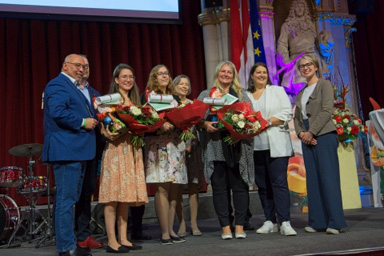 The 2023 award winners
The 2023 award winners
This year, the jury awarded a joint children's prize, three children's prizes for children up to the age of 14 and three children's prizes for children up to the age of 6, as well as the three main prizes.
Supporting programme
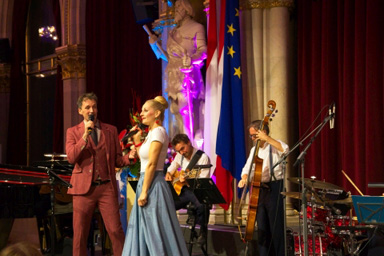 After the award ceremony, the extensive buffet was opened with culinary delicacies from the Vienna City Hall cellar. The prizewinners works could be admired up close at the Nordbuffet. The liquid delicacies from the ladies of the Floridsdorf district organisation's women's group were particularly popular. Their home-made liqueurs and schnapps were very popular and invited visitors to linger.
The creative and elaborate gourmet decorations from the Viennese nurseries are particularly noteworthy this year. After the event, guests were free to help themselves to these. This year, not only delicacies but also works of art could be taken home. On the one hand, a photo wall invited guests to have their personal memories taken, and on the other hand, the quick-drawing artist and caricaturist Ray van Stift was very well attended this year.
After the award ceremony, the extensive buffet was opened with culinary delicacies from the Vienna City Hall cellar. The prizewinners works could be admired up close at the Nordbuffet. The liquid delicacies from the ladies of the Floridsdorf district organisation's women's group were particularly popular. Their home-made liqueurs and schnapps were very popular and invited visitors to linger.
The creative and elaborate gourmet decorations from the Viennese nurseries are particularly noteworthy this year. After the event, guests were free to help themselves to these. This year, not only delicacies but also works of art could be taken home. On the one hand, a photo wall invited guests to have their personal memories taken, and on the other hand, the quick-drawing artist and caricaturist Ray van Stift was very well attended this year.
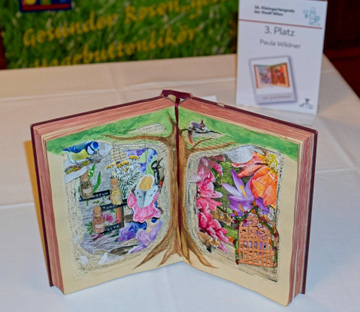 The evening was musically enriched by the Zuckerwatte Combo with a rousing pop revue from the 50s and 60s. Young and old sang and danced in front of the stage until the evening drew to a close at around 9 pm. In keeping with the music programme, there was also a candyfloss stand in the north buffet for young and old.
The evening was musically enriched by the Zuckerwatte Combo with a rousing pop revue from the 50s and 60s. Young and old sang and danced in front of the stage until the evening drew to a close at around 9 pm. In keeping with the music programme, there was also a candyfloss stand in the north buffet for young and old.
We would like to thank all guests and organisers for the successful evening and hope to see you again next year for the 27th allotment garden award ceremony.